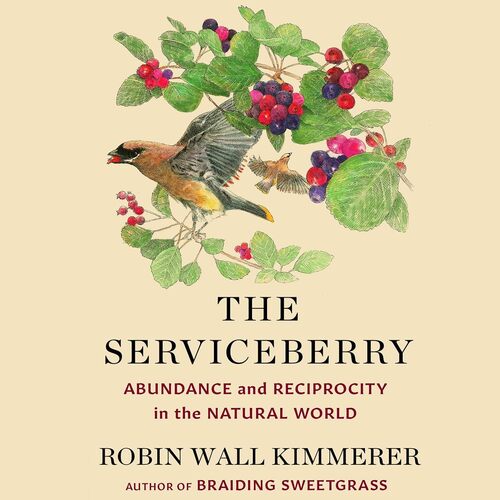Introduction
Over the next four weeks, we will be reading Dr. Robin Wall Kimmerer’s book The Serviceberry: Abundance and Reciprocity in the Natural World. My hope is that we will be open to how the Holy Spirit is stirring in our midst as we glean the wisdom of an indigenous woman botanist.
While our source text is not inherently Christian, there is a tangible overlap of our call to care for creation. Dr. Ellen Davis in her book Scripture, Culture, and Agriculture reminds us that within the Hebrew Bible (The Old Testament), “Beginning with the first chapter of Genesis, there is no extensive exploration of the relationship between God and humanity that does not factor the land and its fertility into that relationship.” By holding in conversation Scripture, The Serviceberry, suggested reading, and our own experience I hope that we might form a deeper understanding of God’s Grace and our place in this world.
In preparation for reading The Serviceberry by Robin Wall Kimmerer here are some suggested readings that help us consider all of Creation as a gift, a tangible example of Grace. These readings also give faith-based language to Kimmerer’s theme of gift economies.
Scripture Readings:
Suggested Additional Readings:
Grace is the Currency of the True Economy:
https://www.frontporchrepublic.com/2019/10/grace-is-the-currency-of-the-true-economy/
Two Economies, Wendell Berry
http://www.worldwisdom.com/public/viewpdf/default.aspx?article-title=Two_Economies_by_Wendell_Berry.pdf
An excerpt from Dan Barber’s The Third Plate: field Notes on the Future of Food
“And the Klaas martens rose to tell his story. Standing six foot three, with his John Deere baseball cap askew and his overalls hiked alarmingly high, he looked more Gomer Pyle than agricultural statesman. I decided to get back to the kitchen, but as I turned to leave, Klaas offered the group a simple question: “when do you start raising a child?” Just like that. It was an oddball opening to a talk about his life’s work, but Klaas’s humble, practical tone drew everyone's attention. I stayed for the answer.
Klaas said he’d come to the question through his interest in the Mennonite community, a group he had known over the years and greatly respected. He explained that Mennonites forbid the use of rubber tires on their farm tractors. The Fertile Dozen shook their heads in near unison. Klaas smiled, acknowledging the severity of the decree—steel-tired tractors inch along, slow as oxen.
He said one day he got up the nerve to ask a Mennonite bishop why rubber tires were forbidden. The bishop answered Klaas’s question with a question: “When do you start raising a child?” According to the bishop, Klaas told us, child rearing begins not at birth, or even conception, but one hundred years before a child is born, “because that’s when you start building the environment they’re going to live in.”
Mennonites, he went on, believe that if you look at the history of tractors with rubber tires, you see failure within a generation. Rubber tires enable easy movement, and easy movement means that, inevitably, the farm will grow, which means more profit. More profit, in turn, leads to the acquisition of even more land, which usually means less crop diversity, more large machinery, and so on. Pretty soon the farmer becomes less intimate with his farm. It’s that lack of intimacy that leads to ignorance, and eventually to loss”
Over the next four weeks, we will be reading Dr. Robin Wall Kimmerer’s book The Serviceberry: Abundance and Reciprocity in the Natural World. My hope is that we will be open to how the Holy Spirit is stirring in our midst as we glean the wisdom of an indigenous woman botanist.
While our source text is not inherently Christian, there is a tangible overlap of our call to care for creation. Dr. Ellen Davis in her book Scripture, Culture, and Agriculture reminds us that within the Hebrew Bible (The Old Testament), “Beginning with the first chapter of Genesis, there is no extensive exploration of the relationship between God and humanity that does not factor the land and its fertility into that relationship.” By holding in conversation Scripture, The Serviceberry, suggested reading, and our own experience I hope that we might form a deeper understanding of God’s Grace and our place in this world.
In preparation for reading The Serviceberry by Robin Wall Kimmerer here are some suggested readings that help us consider all of Creation as a gift, a tangible example of Grace. These readings also give faith-based language to Kimmerer’s theme of gift economies.
Scripture Readings:
- Exodus 16:1-36
- Luke 12:13-21
Suggested Additional Readings:
Grace is the Currency of the True Economy:
https://www.frontporchrepublic.com/2019/10/grace-is-the-currency-of-the-true-economy/
Two Economies, Wendell Berry
http://www.worldwisdom.com/public/viewpdf/default.aspx?article-title=Two_Economies_by_Wendell_Berry.pdf
An excerpt from Dan Barber’s The Third Plate: field Notes on the Future of Food
“And the Klaas martens rose to tell his story. Standing six foot three, with his John Deere baseball cap askew and his overalls hiked alarmingly high, he looked more Gomer Pyle than agricultural statesman. I decided to get back to the kitchen, but as I turned to leave, Klaas offered the group a simple question: “when do you start raising a child?” Just like that. It was an oddball opening to a talk about his life’s work, but Klaas’s humble, practical tone drew everyone's attention. I stayed for the answer.
Klaas said he’d come to the question through his interest in the Mennonite community, a group he had known over the years and greatly respected. He explained that Mennonites forbid the use of rubber tires on their farm tractors. The Fertile Dozen shook their heads in near unison. Klaas smiled, acknowledging the severity of the decree—steel-tired tractors inch along, slow as oxen.
He said one day he got up the nerve to ask a Mennonite bishop why rubber tires were forbidden. The bishop answered Klaas’s question with a question: “When do you start raising a child?” According to the bishop, Klaas told us, child rearing begins not at birth, or even conception, but one hundred years before a child is born, “because that’s when you start building the environment they’re going to live in.”
Mennonites, he went on, believe that if you look at the history of tractors with rubber tires, you see failure within a generation. Rubber tires enable easy movement, and easy movement means that, inevitably, the farm will grow, which means more profit. More profit, in turn, leads to the acquisition of even more land, which usually means less crop diversity, more large machinery, and so on. Pretty soon the farmer becomes less intimate with his farm. It’s that lack of intimacy that leads to ignorance, and eventually to loss”

